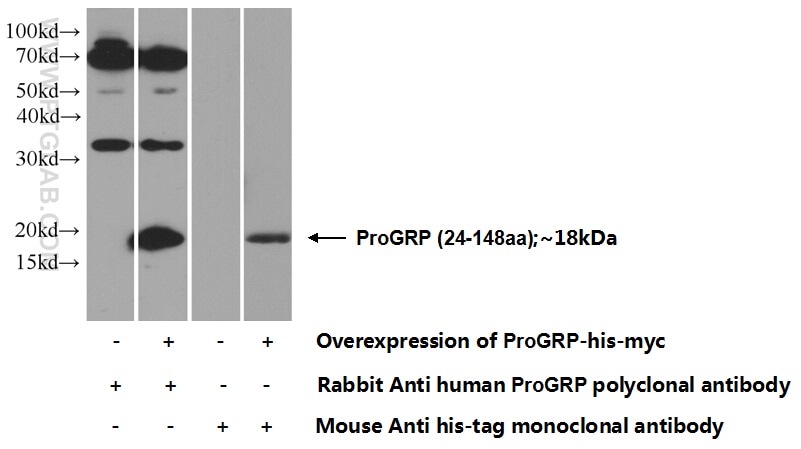ProGRP Polyklonaler Antikörper
ProGRP Polyklonal Antikörper für ELISA
Wirt / Isotyp
Kaninchen / IgG
Getestete Reaktivität
human und mehr (1)
Anwendung
IHC, ELISA
Konjugation
Unkonjugiert
Kat-Nr. : 14646-1-AP
Synonyme
Geprüfte Anwendungen
Veröffentlichte Anwendungen
| IHC | See 1 publications below |
Produktinformation
14646-1-AP bindet in IHC, ELISA ProGRP und zeigt Reaktivität mit human
| Getestete Reaktivität | human |
| In Publikationen genannte Reaktivität | Schimpanse |
| Wirt / Isotyp | Kaninchen / IgG |
| Klonalität | Polyklonal |
| Typ | Antikörper |
| Immunogen | ProGRP fusion protein Ag6239 |
| Vollständiger Name | gastrin-releasing peptide |
| Berechnetes Molekulargewicht | 16 kDa |
| GenBank-Zugangsnummer | BC004488 |
| Gene symbol | GRP |
| Gene ID (NCBI) | 2922 |
| Konjugation | Unkonjugiert |
| Form | Liquid |
| Reinigungsmethode | Antigen-Affinitätsreinigung |
| Lagerungspuffer | PBS with 0.02% sodium azide and 50% glycerol |
| Lagerungsbedingungen | Bei -20°C lagern. Nach dem Versand ein Jahr lang stabil Aliquotieren ist bei -20oC Lagerung nicht notwendig. 20ul Größen enthalten 0,1% BSA. |
Hintergrundinformationen
Gastrin-releasing peptide, also known as GRP, is normally formed by mucosal cells in the gastric antrum and by the D cells of the pancreatic islets, and its main function is to stimulate secretion of HCl by the gastric mucosa. HCl, in turn, inhibits gastrin formation. Its 148-amino acid preproprotein, following cleavage of a signal peptide, is further processed to produce either the 27-amino acid gastrin-releasing peptide or the 10-amino acid neuromedin C. These smaller peptides regulate numerous functions of the gastrointestinal and central nervous systems, including release of gastrointestinal hormones, smooth muscle cell contraction, and epithelial cell proliferation.These peptides are also likely to play a role in human cancers of the lung, colon, stomach, pancreas, breast, and prostate.


